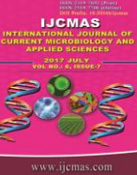


 National Academy of Agricultural Sciences (NAAS)
National Academy of Agricultural Sciences (NAAS)

|
PRINT ISSN : 2319-7692
Online ISSN : 2319-7706 Issues : 12 per year Publisher : Excellent Publishers Email : editorijcmas@gmail.com / submit@ijcmas.com Editor-in-chief: Dr.M.Prakash Index Copernicus ICV 2018: 95.39 NAAS RATING 2020: 5.38 |
Microorganisms play a vital role in cleaning up the environment by degrading the pollutants like mono aromatics and polycyclic aromatic hydrocarbons (PAHs) which are toxic and are among the most prevalent and persistent pollutants in the environment. Soil contaminated with petroleum generally contains a mixture of polycyclic aromatic hydrocarbons (PAHs) and heterocyclic aromatics. Aromatic compounds derived from industrial activities often have functional groups such as alkyls, halogens and nitro groups. Naphthalene is a polycyclic aromatic hydrocarbon (PAH) which is persistent in the environment and is toxigenic, carcinogenic and mutagenic that has motivated scientists in putting efforts to remove it from the environment. Incomplete combustion of fossil fuels releases them into the environment thereby polluting it. Bioremediation is one of the natural processes that help to remove xenobiotic compounds from the environment with the help of microorganisms. The aim of our study is to isolate some potential microbial agents to degrade naphthalene into non-hazardous or less hazardous derivatives. A bacterial strain was isolated from oil contaminated soil of Guwahati Refinery, labeled as RD3, and later identified as Nocardiopsis alba, was found tolerant to naphthalene in culture media and was able to degrade the naphthalene into its derivatives. The products that were detected in naphthalene culture broth were identified mainly as acetic acid and phthalic acid. However, the ring fission products, 2-dodecan-1-yl-succinic anhydride and octadec-9-enoic acid were also detected as transformation products, which confirmed the degradation of naphthalene by the bacterial strain.
 |
 |
 |
 |
 |